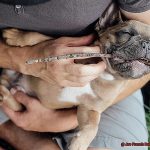Are Frenchies being overbred?
Today, we’re diving into a seriously sizzling topic that’s been causing quite the commotion in the pet community: are Frenchies being overbred? I bet you’ve noticed these squishy-faced cuties popping up left and right lately, but have you ever stopped to ponder if there’s a dark side to their sudden popularity?
Well, wonder no more. In this blog post, we’re going to take a closer peek at the issue of overbreeding in French Bulldogs.

So, strap yourselves in and let’s get down to the nitty-gritty of this pawsitively fascinating debate.
Popularity of French Bulldogs: How Did This Breed Become So Popular?
Contents
- 1 Popularity of French Bulldogs: How Did This Breed Become So Popular?
- 2 Health Issues in French Bulldogs: What Are the Common Health Problems?
- 3 Unethical Breeding Practices: How Can We Combat This Problem?
- 4 Responsible Breeding Practices: What Should Breeders Consider?
- 5 The Impact of Overbreeding on French Bulldogs: What Are the Consequences of Unethical Breeding Practices?
- 6 Adoption as an Alternative to Buying a Puppy: How Can We Reduce Demand for Overbred French Bulldogs?
- 7 Educating Potential Dog Owners About Responsible Breeding: Why Is Education Important?
- 8 Conclusion
Their rise in popularity over recent years has been truly remarkable. In this article, we will delve into the factors that have contributed to their widespread fame and discuss the implications of this newfound popularity.
Adorable Appearance:
With their large, round eyes, bat-like ears, and compact size, French Bulldogs possess an irresistible charm. Their unique appearance sets them apart from other breeds and makes them highly sought after by dog enthusiasts.
Friendly and Affectionate Nature:
French Bulldogs are renowned for their friendly and affectionate disposition. They thrive on human company and make excellent companions for individuals and families alike. Their ability to get along well with children and other pets adds to their appeal.
Adaptability:
One of the reasons behind the French Bulldog’s surge in popularity is their adaptability to various living situations. Whether it’s a small apartment or a spacious home, French Bulldogs can make themselves at home anywhere, making them ideal pets for urban dwellers.
Low Exercise Requirement:
In today’s fast-paced world, many individuals lead busy lifestyles or have limited mobility. French Bulldogs require less exercise compared to some other breeds, making them a perfect match for those seeking a canine companion that doesn’t demand excessive physical activity.
Social Media Influence:
The power of social media cannot be underestimated when it comes to the popularity of French Bulldogs. Platforms like Instagram and Facebook have become virtual showcases for these adorable creatures. Celebrities and influencers proudly flaunt their furry friends, captivating millions of followers worldwide.
Media Exposure:
French Bulldogs have made appearances in movies, TV shows, and advertisements, further fueling their popularity. These on-screen appearances have helped create a positive image of the breed and increased its desirability among potential owners.
The Dark Side of Popularity:
While the popularity of French Bulldogs has brought attention to their unique characteristics, it has also resulted in unethical breeding practices. Overbreeding has become a concern, leading to potential health issues in the puppies. Responsible ownership and supporting ethical breeders are essential to combat these problems.
Health Issues in French Bulldogs: What Are the Common Health Problems?
French Bulldogs, or “Frenchies,” as they are affectionately called, are known for their adorable appearance and fun-loving personalities. However, like any other breed of dog, Frenchies are prone to certain health issues that owners should be aware of. Understanding the common health problems in French Bulldogs is crucial for their overall well-being and can help owners take proactive measures to ensure their pets live happy and healthy lives.
Brachycephalic Airway Syndrome:
Due to their unique facial structure with a short muzzle and flat face, Frenchies often experience breathing difficulties. This can lead to snoring, wheezing, and even respiratory distress. It is important for owners to be mindful of their Frenchie’s breathing patterns and seek veterinary assistance if any abnormalities are noticed.
Allergies:
These adorable canines are prone to skin allergies, which can be triggered by various factors such as food, environmental allergens, or even certain grooming products. Allergy symptoms in French Bulldogs may include itching, redness, and recurrent ear infections. It is essential for owners to identify the allergens causing discomfort to their pets and make necessary changes in their environment or diet to alleviate the allergic reactions.
Orthopedic Issues:
French Bulldogs are also susceptible to orthopedic issues, particularly hip dysplasia. This condition occurs when the hip joint does not develop properly, leading to pain and difficulty in movement. Owners should be cautious of their Frenchie’s activity levels and provide them with regular exercise while avoiding excessive strain on their joints.
Skinfold Dermatitis:
Their adorable wrinkles and folds can become a breeding ground for bacteria and yeast infections if not properly cleaned and maintained. Owners must take diligent care of their Frenchie’s skin by regularly cleaning the folds and ensuring they are dry to prevent infections from developing.
Eye Problems:
French Bulldogs are prone to a variety of eye problems. They often suffer from conditions such as cherry eye, entropion (inward rolling of the eyelids), and cataracts. These eye issues can cause discomfort and potentially lead to vision impairment if left untreated. Regular eye examinations by a veterinarian can help detect any abnormalities early on and prevent further complications.
Unethical Breeding Practices: How Can We Combat This Problem?
As the popularity of these adorable dogs continues to rise, so does the demand for them. Unfortunately, this has led to some breeders prioritizing profit over the health and well-being of the dogs. But fear not, there are steps we can take to combat this problem.
Stricter Regulation
One of the key ways to combat unethical breeding practices is through stricter regulation and enforcement within the French Bulldog community. Breed clubs and organizations should establish guidelines for responsible breeding, including limits on the number of litters a female can have in her lifetime. This will help prevent overbreeding, which can lead to serious health issues for both the mother and the puppies.
Mandatory Health Screenings
In addition to limiting the number of litters, breeders should also be required to conduct mandatory health screenings for potential breeding dogs. This will help identify and eliminate dogs with known genetic health issues from the breeding pool. By only breeding healthy dogs, we can reduce the risk of passing on these issues to future generations.
Education
Education is key in combatting unethical breeding practices. Prospective French Bulldog owners should be educated on the importance of buying from reputable breeders who prioritize the health and well-being of their dogs. They should be made aware of the risks associated with overbreeding and the importance of genetic health testing in breeding dogs. By empowering individuals with knowledge, we can encourage responsible purchasing decisions.
Promote Adoption
Promoting adoption and rescue efforts can also help combat unethical breeding practices. Many French Bulldogs end up in shelters or rescue organizations due to irresponsible breeding practices. By adopting from these sources, individuals can provide a loving home for a dog in need and send a message that unethical breeding practices are not supported. Additionally, adopting a rescue dog often comes with the added benefit of knowing that you are giving a second chance to a dog in need.
Responsible Breeding Practices: What Should Breeders Consider?
If you’re considering breeding these lovable dogs, it’s crucial to prioritize responsible breeding practices. As an experienced breeder with a deep understanding of the breed, I’ll share the key factors you should consider when breeding French Bulldogs.

Health and Genetic Soundness:
Ensuring the health and genetic soundness of your breeding dogs is of utmost importance. Conduct thorough health screenings and tests to identify any hereditary conditions or diseases that may be present in the bloodline. By only breeding healthy dogs with good genetic backgrounds, you can minimize the risk of passing on genetic disorders to future generations.
Preserving Breed Characteristics:
Maintaining the physical characteristics and temperament that are unique to French Bulldogs is essential. Select dogs with desirable traits while avoiding extreme or exaggerated features that may compromise their overall well-being. Striking a balance between preserving breed characteristics and promoting health and functionality is crucial.
Proper Socialization and Upbringing:
Properly socializing your puppies from an early age is vital for their development. Expose them to various environments, people, and other animals to ensure they grow up to be confident and sociable dogs. Investing time and effort in providing appropriate early experiences greatly influences their behavior and temperament in adulthood.
Responsible Ownership:
Thoroughly vetting potential buyers is essential to ensure responsible ownership. Ask about their lifestyle, experience with dogs, and commitment to providing proper care throughout the dog’s life. Offer guidance and support to new owners, being available for any questions or concerns they may have.
Limiting Litters:
Overbreeding can have negative consequences on both the mother dog’s health and the quality of the puppies produced. Plan your breeding program carefully, allowing sufficient time for the mother dog to recover before considering another breeding. This helps prevent physical and emotional strain and ensures the best possible outcome for both mother and puppies.
Welfare of the Dogs:
Always prioritize the welfare of the dogs in your care. Provide proper nutrition, veterinary care, and a clean and safe environment. Dogs should have ample space to exercise, play, and enjoy mental stimulation and social interaction. Be prepared to take back any dog you’ve bred if the owner is no longer able or willing to care for it.
The Impact of Overbreeding on French Bulldogs: What Are the Consequences of Unethical Breeding Practices?
However, the rising popularity of this breed has unfortunately led to unethical breeding practices and their associated consequences. In this article, we will explore the impact of overbreeding on French Bulldogs and discuss the importance of responsible breeding to protect the future of this beloved breed.
Genetic Disorders and Health Issues:
Overbreeding without proper consideration for health can lead to a higher prevalence of genetic disorders in French Bulldogs. Breeders prioritizing quantity over quality may ignore necessary health screenings, resulting in an increased risk of conditions such as hip dysplasia, respiratory issues, eye problems, and skin disorders. This can significantly impact the well-being and quality of life for these dogs.
Reduced Genetic Diversity:
Continuous mating of closely related dogs in unethical breeding practices reduces the gene pool within the French Bulldog population. This lack of genetic diversity increases the likelihood of inherited diseases and compromises the breed’s long-term health and vitality. Responsible breeders prioritize maintaining a diverse gene pool through careful selection and outcrossing strategies.
Poor Temperament and Behavior Issues:
French Bulldogs bred solely for profit, without proper socialization or training, are more likely to develop poor temperament and behavior issues. These dogs may exhibit aggression, anxiety, or other behavioral problems due to their lack of early experiences and inadequate care. Responsible breeders prioritize socialization and provide a nurturing environment for their puppies.
Shelter Overpopulation:
Unethical breeding practices contribute to an abundance of French Bulldogs in shelters and rescues. Breeders who produce more puppies than there is demand for often result in many dogs being abandoned or surrendered. This puts a strain on rescue organizations and perpetuates the cycle of overbreeding. Adopting from reputable sources or supporting rescue organizations can help alleviate this problem.
Rise of Puppy Mills and Backyard Breeders:
The increasing demand for French Bulldogs has created a lucrative market for unethical breeders. Puppy mills and backyard breeders prioritize profit over the welfare of the dogs, leading to poor living conditions, inadequate care, and unhealthy breeding practices. By avoiding these sources and educating others about responsible breeding, we can combat the rise of these unethical operations.
Adoption as an Alternative to Buying a Puppy: How Can We Reduce Demand for Overbred French Bulldogs?
Before you rush to buy a puppy, consider the benefits of adopting a French Bulldog instead. By choosing adoption, you not only provide a loving home for a dog in need but also contribute to reducing the demand for overbred French Bulldogs. In this article, we will explore how education, collaborations, regulations, and incentives can help us achieve this goal.
Education:
- Raising awareness: Many people are unaware of the number of French Bulldogs in shelters and mistakenly believe that they can only find purebred puppies through breeders. Educating potential owners about the availability and benefits of adopting from shelters is vital.
- Dispelling myths: Debunking misconceptions surrounding shelter dogs, such as temperament or health issues, helps potential adopters make informed decisions.
Collaborations:
- Animal welfare organizations: Collaborating with local shelters and rescue organizations can provide valuable resources for potential adopters, including information on available French Bulldogs and the adoption process.
- Breed clubs: Working together with breed clubs allows for the promotion of responsible ownership and adoption within the French Bulldog community.
- Veterinarians: Veterinarians play a crucial role in spreading awareness about adoption and can provide medical advice and support to new adopters.
Regulations:
- Stricter breeding practices: Implementing regulations that require breeders to prioritize the health and well-being of their dogs can discourage overbreeding and ensure responsible practices.
- Penalties for irresponsible breeders: Enforcing penalties for breeders who engage in unethical practices further discourages overbreeding and encourages responsible pet ownership.
Incentives:
- Financial support: Offering tax breaks or financial assistance for those who choose to adopt from shelters can make adoption more financially viable for potential owners.
- Benefits package: Providing adopters with a comprehensive benefits package, including vaccinations, spaying/neutering, and microchipping, makes adoption a more attractive option compared to purchasing a puppy from a breeder.
Educating Potential Dog Owners About Responsible Breeding: Why Is Education Important?
As an expert in the field, I have witnessed the negative consequences of irresponsible breeding practices and believe that education is the key to making a positive change. So, grab a cup of coffee and let’s dive in.
Preventing Overbreeding:
Picture this: countless adorable French Bulldog puppies flooding shelters because of overbreeding. It’s a heartbreaking reality that can be prevented through education. By raising awareness about the consequences of overbreeding, potential dog owners can make informed decisions and choose breeders who prioritize the well-being and health of their dogs. This, in turn, helps reduce the number of unwanted dogs and overcrowded shelters.
Promoting Ethical Breeding Practices:
Education empowers potential dog owners to distinguish between reputable breeders and unethical ones. Reputable breeders prioritize the health and genetic diversity of their dogs, while unethical breeders or puppy mills focus on profit at the expense of animal welfare. By educating themselves, potential dog owners can support responsible breeders and discourage unethical breeding practices.
Advocacy for Change:
Education not only benefits individual dog owners but also encourages them to become advocates for change in their communities. Armed with knowledge about responsible breeding, they can spread awareness about the importance of adopting from shelters or rescue organizations rather than supporting irresponsible breeders. By advocating for responsible breeding practices, they can contribute to the overall welfare of dogs and combat overbreeding.
R5Vt-xhso0Y” >
Conclusion
In conclusion, the skyrocketing popularity of French Bulldogs has shone a spotlight on their unique traits and irresistible charm. However, this surge in demand has also given rise to unscrupulous breeding practices and the alarming overbreeding of these adorable canines. The repercussions of such practices are extensive, posing serious threats to the breed’s health, well-being, and genetic diversity.
To tackle this issue head-on, it is imperative for both breeders and prospective dog owners to prioritize responsible breeding methods. Implementing stricter regulations, mandating comprehensive health screenings, educating about the perils of overbreeding, and actively promoting adoption from shelters are all indispensable measures in combating this problem.
By supporting reputable breeders who prioritize their dogs’ welfare and genetic backgrounds, potential owners can ensure they bring home a robust and healthy puppy. Moreover, opting to adopt from shelters or rescue organizations not only provides a loving sanctuary for a deserving dog but also serves as a resounding message against unethical breeding practices.
Education plays an integral role in preventing overbreeding and fostering responsible ownership. By raising awareness about the dire consequences of overbreeding and championing change within our communities, we can make a profound impact on French Bulldogs’ well-being while curbing the prevalence of overbreeding.




